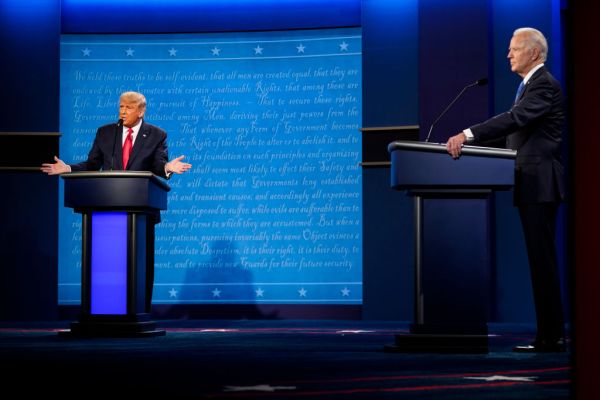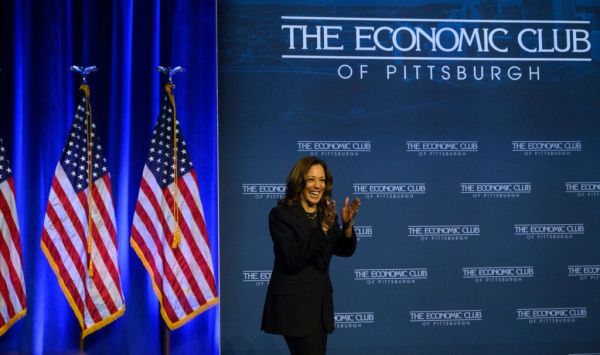Last weekend, Donald Trump delivered what even he admitted was a “dark” speech.
Beyond the usual nonsense about America ceasing to exist if he loses, he called illegal immigrants “vile animals” and “monsters” who “will walk into your kitchen, they'll cut your throat.” The supposed enemy of censorship said that the media, including Fox News, shouldn’t “be allowed” to cover Kamala Harris’ speech on immigration. He called Harris “mentally disabled.” And he mused that the solution to shoplifting might be to give the police an hour of “real rough, nasty,” unrestrained violence.
As strange as it sounds, Trump’s increasingly repugnant rhetoric is an effort to win over undecided voters.
This might seem like an odd thing to say given that pundits (including me) keep saying the presidential race is extremely close and that few undecided voters remain. The common assumption is that such voters are usually thought of as moderates who dislike extremist politics. That’s true enough. But there’s a difference between people who have decided to vote but aren’t sure for whom, and those who know which candidate they support but haven’t decided whether to vote at all.
It’s like the difference between a film buff who will definitely go to the movies this weekend but isn’t sure what to see, and someone who is interested in one movie but isn’t sure it’s worth the effort to go to the theater. Why not just wait for it to show up on Netflix?
It turns out that there are a lot more wait-for-Netflix voters than indecisive-film-buff voters.
Ron Brownstein wrote an illuminating exploration of all this for The Atlantic. Among campaign professionals, people who can be convinced to back a specific candidate are called “persuadable voters.” Those who have to be motivated to vote at all are called “irregular voters.”
Trump’s apocalyptic rhetoric probably turns off most persuadable voters. But it may be just the ticket to move a subgroup of irregular voters.
Plenty of decent, knowledgeable people decline to vote regularly for various reasons, but most of the irregulars — especially those Trump and his boosters are hoping to motivate — are low-information voters. Most of what they hear about politics comes from social media “influencers” such as Tucker Carlson and Candace Owens.
If you’re not normally inclined to vote, policy differences aren’t going to motivate you to do so. But being told America’s very existence depends on it might.
That’s precisely what Elon Musk, the owner of X and prominent Trump supporter, told his 200 million followers on Saturday. “Very few Americans realize that, if Trump is NOT elected, this will be the last election,” Musk wrote. “Far from being a threat to democracy, he is the only way to save it!”
Now, I think this is dangerous nonsense. But if you didn’t know much about politics, it would be a pretty compelling reason to vote.
As Brownstein notes, the media are fairly obsessed with voters who swing from one party to another. We’ve seen countless focus groups and interviews with such people. But they’re a tiny fraction of potential voters compared with those who don’t normally vote at all.
Even in 2020, the highest-turnout national election in more than a century, a third of eligible voters—about 80 million people—stayed home. All else being equal, if Trump or Harris could disproportionately turn out even a tenth of such people, it would be enough for a landslide.
I don’t have a lot of respect or admiration for the sort of low-information voters who have to be duped into voting with apocalyptic and demonizing bilge. But I have greater contempt for the voters—and especially the leaders—who condone the strategy even though they know better. Let’s call them the “normies.”
Trump’s normie defenders in elected office and the media dismiss his irresponsible rhetoric and conspiracy theories as an unfortunate distraction. The closest they get to criticizing him for it is mumbling that he should “stick to the issues.” They put far more energy into trying to say Trump has a point.
As a result, Trump can take normie voters and politicians for granted because they’re cheap dates who will support him no matter what. This empowers him to expand his coalition to people motivated by his celebrations of bigotry, crudeness, and violence.
The normies make up the majority of the electorate because they vote reliably. But because Trump can rely on their unconditional support, it’s the normies who’ve acquiesced to the degeneration of the GOP and who could make Trump’s grotesquerie a winning strategy.







Please note that we at The Dispatch hold ourselves, our work, and our commenters to a higher standard than other places on the internet. We welcome comments that foster genuine debate or discussion—including comments critical of us or our work—but responses that include ad hominem attacks on fellow Dispatch members or are intended to stoke fear and anger may be moderated.
With your membership, you only have the ability to comment on The Morning Dispatch articles. Consider upgrading to join the conversation everywhere.